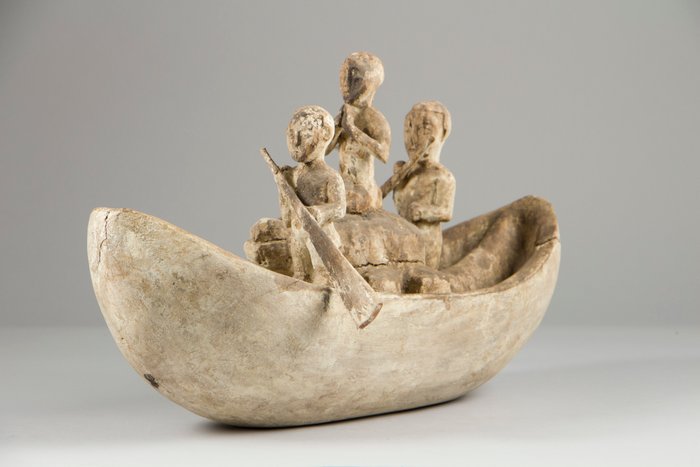Estimated age: between 1950 and 1960 - Pirogue of collection - Of a large size, in good condition
Ethnic group: ÉWÉ / EHWE.
Country of origin: Togo.
Estimated age: between 1950 and 1960.
Main material: wood.
Aspect of surface: crusty.
Apparent condition: Good condition.
State of preservation: in its original condition.
Dimensions, in cm: 47 x 28 x 28 cm.
Weight, in grams: 2695 grams.
For the ÉWÉ, the turtle is the symbol of calm and temperance.
The ÉWÉ are a people of Western Africa, mainly established in the Southeast of Ghana and in the South of Togo (where they form the majority of the population), and also in the Southwest of Benin. They speak the Éwé language.
The ÉWÉ (Eibe, Ehwe, Eve, Vhe, Krepe, Krepi, Popo) originate from the Notsé, from where they spread throughout the southern region. They dispersed in 3 directions. In the North they founded, among other things, the cities of Kpalimé and Agou, in the South they built the town of Tsévié, and towards the sunset they gave birth to the city of Ho (Ghana). A 4th group left the town of Notsé later and settled in the Southeast to give birth to the country of Ouatchi.
Foreigners often mistake this ethnic group with the MINA who form a minority group in Southern Togo. That is why in many references made to the life of the Togolese, including the ones given by foreign journalists, the word Mina is often used erroneously in place of the term Éwé.
Country of origin: Togo.
Estimated age: between 1950 and 1960.
Main material: wood.
Aspect of surface: crusty.
Apparent condition: Good condition.
State of preservation: in its original condition.
Dimensions, in cm: 47 x 28 x 28 cm.
Weight, in grams: 2695 grams.
For the ÉWÉ, the turtle is the symbol of calm and temperance.
The ÉWÉ are a people of Western Africa, mainly established in the Southeast of Ghana and in the South of Togo (where they form the majority of the population), and also in the Southwest of Benin. They speak the Éwé language.
The ÉWÉ (Eibe, Ehwe, Eve, Vhe, Krepe, Krepi, Popo) originate from the Notsé, from where they spread throughout the southern region. They dispersed in 3 directions. In the North they founded, among other things, the cities of Kpalimé and Agou, in the South they built the town of Tsévié, and towards the sunset they gave birth to the city of Ho (Ghana). A 4th group left the town of Notsé later and settled in the Southeast to give birth to the country of Ouatchi.
Foreigners often mistake this ethnic group with the MINA who form a minority group in Southern Togo. That is why in many references made to the life of the Togolese, including the ones given by foreign journalists, the word Mina is often used erroneously in place of the term Éwé.

Geen opmerkingen:
Een reactie posten